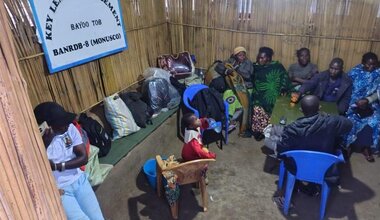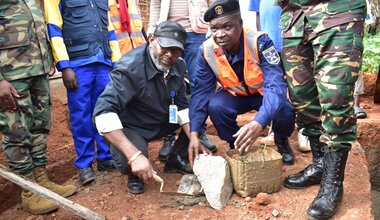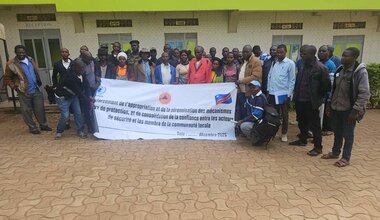A survey on consequences of artisanal exploitation of natural resources for Congolese women
Kinshasa, 25 November 2010 - On the occasion of the International Day for the Elimination of Violence against Women, the Gender office of the United Nations Stabilization Mission in the Democratic Republic of Congo (MONUSCO) presented the results of nationwide pilot survey of the socioeconomic impacts of the artisanal exploitation of natural resources on Congolese women and girls. The aim of the survey was to collect the necessary data to strengthen the protection of these categories, who are also victims of gender-based violence.
The two-month-long survey was conducted within the framework of the reinforcement of the strategy for the protection of women in the DRC, which is one of MONUSCO's priorities. A workshop was held in Kinshasa, which brought together national experts and MONUSCO's gender focal points to harmonize the results from the identified seven provinces: Orientale, North Kivu, South Kivu, Katanga, Eastern Kasai, Western Kasai and Maniema.
Among other things, the survey helped to establish a first database on the involvement of women in the exploitation of natural resources. Other objectives were long-term and designed to promote sustainable economic, social and cultural development of women and girls in the DRC.
The main conclusion
The survey found that a significant number of rural women work in sites of artisanal exploitation of natural resources - such as gold, diamond and crushed stone - of which the country has plenty. The study showed however that in the surrounding areas of these sites, women and girls fall victim to rape, abduction, looting, sex slavery and other forms of gender-based violence, and that the perpetrators are men working or owners of these sites and/or armed groups operating in the surrounding areas.
And this is happening despite the United Nations Security Council's Resolution 1325 which, in its chapter 10, "calls on all parties to armed conflict to take special measures to protect women and girls from gender-based violence, particularly rape and other forms of sexual abuse, and all other forms of violence in situations of armed conflict".
The survey listed numerous causes, most of which are known: a gender-insensitive mining code whose revision is expected in 2012; the lack of gender training and sensitization for actors at artisanal exploitation sites; ignorance and non-application of the two laws (2006) against sexual and gender-based violence; these women's ignorance of their rights; and the absence of proper socio-sanitary infrastructure for women and girls.
Few recommendations
Speaking at the workshop on the survey results presentation, the head of MONUSCO, Roger Meece, noted that this survey raised one the major concerns expressed by the UN Security Council in its Resolution 1925, which stipulates that "the linkage between the illicit exploitation and trade of natural resources and the proliferation and trafficking of arms is among the major factors fuelling and exacerbating conflicts in the Great Lakes region".
Mr. Meece, who was addressing such a large audience of women and girls for the first time since he assumed his duties, emphasized that "integration of the gender dimension - men and women - is essential to any process of pacification, stabilization and sustainable development".
Resolution 1325 and follow-up resolutions (1820, 1880, and 1889) state that women's participation AND gender equality form the bedrock of peace consolidation and the building of stable States, founded on respect of human rights and the rule of law. Therefore, Mr. Meece added that "the strategies for civilians' protection cannot ignore the situation of Congolese women and girls in the sites of artisanal exploitation of natural resources".
The presentation of this survey's results was held as part of the commemoration of the "16 Days of Activism against Gender based Violence Campaign", which opens on 25 November (International Day for the Elimination of Violence against Women) and ends on 10 December (International Human Rights Day). There is then "a close link between gender-based violence and respect of human rights (...) and violence against women constituting therefore a human rights violation" Mr. Meece said. In conclusion, he recommended that the survey be used in MONUSCO's sensitization and advocacy campaigns in order to promote the rights of women and girls.
 UN
UN United Nations Peacekeeping
United Nations Peacekeeping






